It’s been 36 hours in Washington. Breakthrough or break in Gaza?
The prospect of a ceasefire between Israel and Hamas, which seemed possible over the weekend, diminished as Sunday turned to Monday. Then a moment, but one that soon evaporated.
So what’s going on?
When President Joe Biden and Prime Minister Benjamin Netanyahu spoke by phone late Monday morning, hope for a deal, being hacked out thousands of miles away in the Qatari capital, Doha, seemed slim.
Instead, the focus was on what Mr Netanyahu planned to do with the troops he had ordered massed in southern Israel, just over the Israeli border fence from the Gazan city of Rafah.
Middle East latest: Follow live updates
Israeli airstrikes hit Rafah. Image: AP
As Mr Netanyahu and Mr Biden spoke, leaflets fluttered down over Rafah, telling the more than a million people there to leave, to head north to Israel’s self-declared safe zones.
President Biden has repeatedly told the Israeli leadership that the United States will not support a ground invasion of Rafah without a comprehensive and viable plan for the civilians – a plan that has not emerged.
But over the past six months, we have all learned that American influence over its ally Israel has its limits.
Even US military officials questioned the logic of a massive ground invasion of such a heavily populated area.
They understand the basic military objectives of rooting out the remaining Hamas battalions hiding in Rafah. Yes, those fighters are hiding behind civilians, but shouldn’t that be thinking a pause rather than plowing on?
Analysis: Peace in Gaza looks as distant as ever
Please use Chrome browser for a more accessible video player
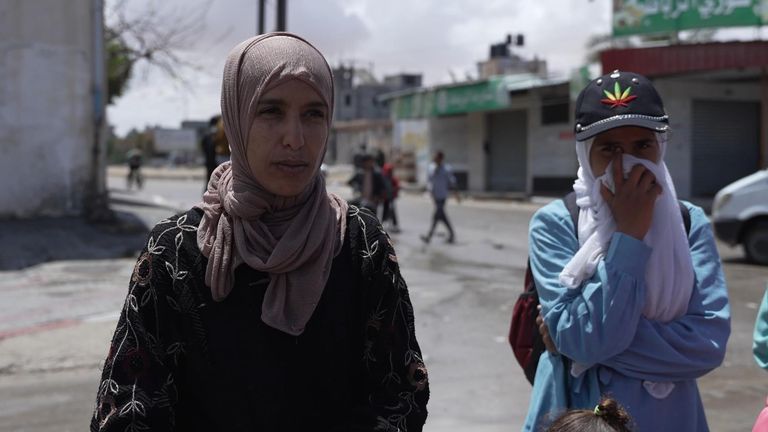
1:18
Displaced people react to the IDF evacuation warning
A military operation doomed to failure?
The consequences of Israel’s policy of flattening the cities north of Rafah are still being calculated.
Beyond the elusive concept of “total victory,” Mr. Netanyahu has never made clear what his political end is or who the political partner in Gaza would be.
By the measure of most students of warfare and history, any military operation that lacks a clear political end is doomed to failure and makes lasting compromise much more difficult.
The phone call between Mr Biden and Mr Netanyahu lasted about half an hour and we are told it was “constructive”.
The president “clarified” his views on the Rafah operation “which could potentially put more than a million innocent people at greater risk,” his spokesman said.
But the vibes from Israel were that the Rafah operation looked more likely than not.
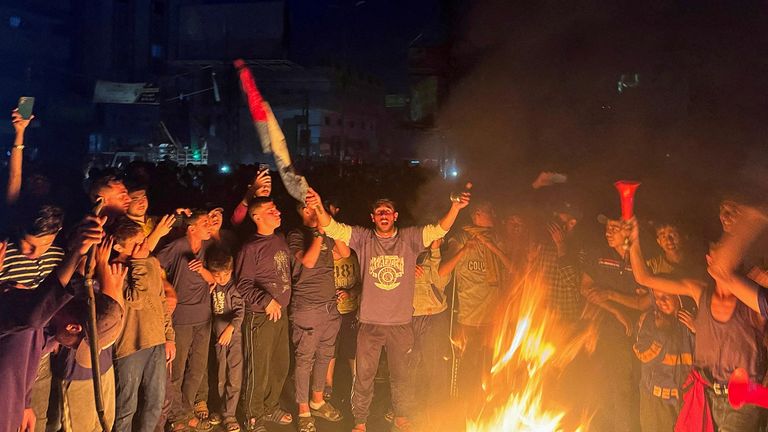
Palestinians cheer after Hamas announced it had accepted a ceasefire proposal. Image: Reuters
Hamas agrees to a ceasefire
Then, at lunch in Washington, suddenly news of a possible breakthrough.
Hamas issued a statement agreeing to the ceasefire.
A great moment it seemed. But what, exactly, were the terms of the deal they agreed to? What deal was it? The one Secretary of State Antony Blinken trumpeted in yet another tour of the region last week? He called it “generous”.
It wasn’t clear, and as I write, it’s still not entirely clear.
But in Rafah – they found out about it. The scenes of jubilation were honestly sad to watch. They are so desperate for peace, but they are so likely to be let down.
Please use Chrome browser for a more accessible video player
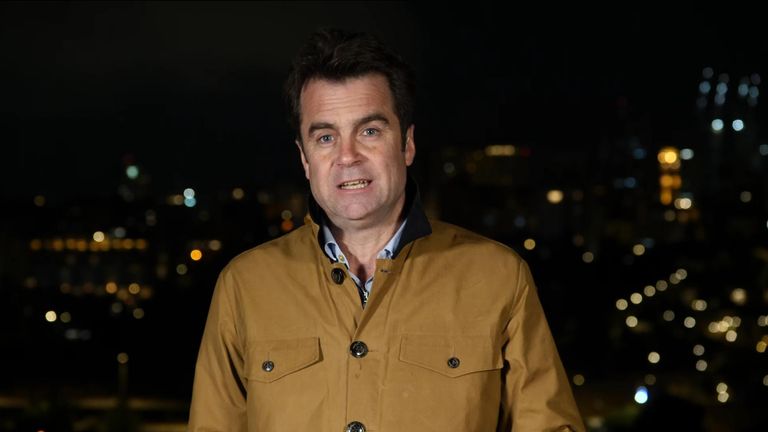
1:59
‘There is no agreement, there is no acceptance’
White House spokesman unaware of latest bombings
A little later, no word from President Biden, but his spokesman, John Kirby, was busy treading water. “We are currently reviewing the response,” was the line from the White House.
Mr Kirby was then asked if he was aware that bombs were being dropped on Rafah as he spoke. Wasn’t that a clear indication that Mr. Netanyahu was rejecting what Hamas had agreed to?
He was not aware of the latest bombings, he said.
Then, in an optically terrifying moment, as the White House spokesman said (again) that President Biden was worried, at best, about something Israel was planning, Israel went ahead and did it anyway.
An IDF statement was released which said: “The IDF is currently conducting targeted strikes against Hamas terror targets in eastern Rafah in the southern Gaza Strip. Details will follow.”
The statement confirmed what our local teams on the ground saw and heard with their eyes and ears.
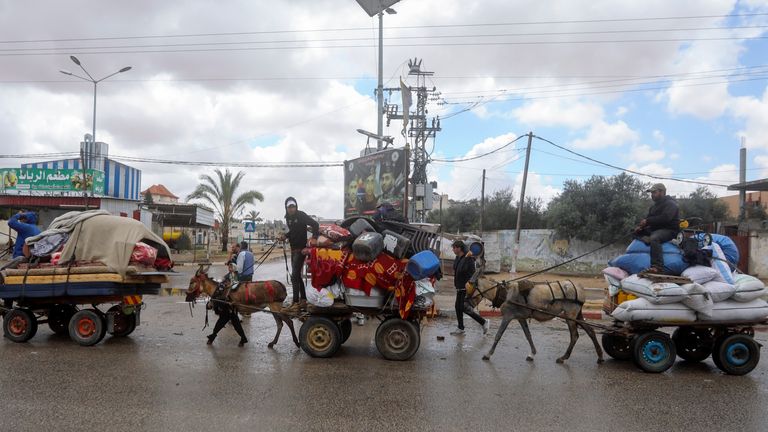
Palestinians flee Rafah after the Israeli army ordered them to evacuate
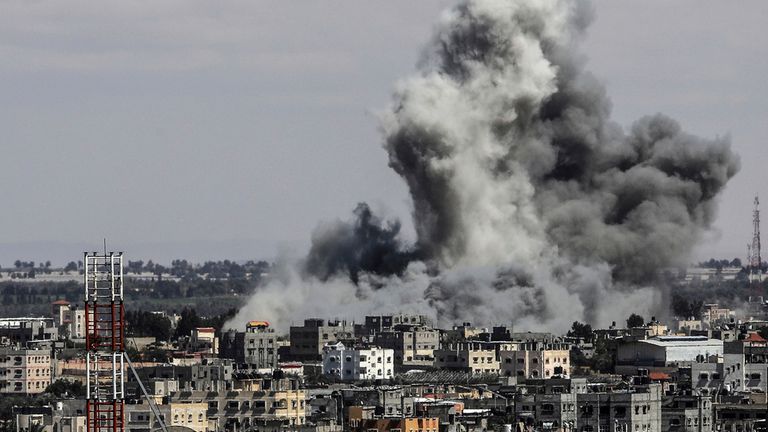
Smoke rises from Rafah after an Israeli airstrike. Photos: AP
Israel to send a team to Egypt for ceasefire negotiations
My social media is once again full of such images that we could never publish due to taste, but which we have seen so many times during this war.
Then a statement from the office of Mr. Netanyahu – the war cabinet “unanimously decided that Israel will continue its operation in Rafah, to apply military pressure on Hamas to promote the release of our hostages and achieve the other goals of the war”.
It added that a team would be sent to Egypt to “maximize the possibility of reaching an agreement on terms acceptable to Israel”.
Jordan could be key to a ceasefire
Rafah is part of Mr. Netanyahu’s negotiation strategy of course.
President Biden was having lunch with King Abdullah of Jordan at the White House when news of the Hamas deal broke.
In a conflict where we are looking hard for honest brokers to decipher what is actually going on, maybe Jordan is close?
It is a key Arab nation, made up of so many exiled Palestinians, but a diplomatic partner of Israel and a key ally of America.
Netanyahu “endangers the deal by bombing Rafah”
After lunch there was no comment from Jordan’s foreign minister, Ayman Safadi, when I asked him if an agreement was really possible.
Then, a tweet from him: “A huge effort has been made to produce an exchange that will release hostages and bring about a ceasefire. Hamas has issued an offer. If Netanyahu really wants a deal, he will seriously negotiate the offer. Instead, he is jeopardizing the deal by bombing Rafah.”
The opposing view is that Hamas has set a trap, subtly changing the terms of the agreement allowing the world to think that Israel has rejected it.
There is one indisputable trap: Gaza. A miserable cycle of human suffering in a locked strip of land.
This story originally appeared on News.sky.com read the full story





































